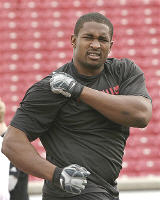The Best and the Brightest
Who says no news is good news? Mainstream media outlets may be mired in selective coverage of the Black community’s most unflattering moments, but local newspapers and independent wire services have not forgotten that scholars, prodigies, and overachievers should also make the news.
Here’s just a sampling of what regional papers and independent newswires across the country have to say about the best and brightest Black high school graduates from the class of 2007:
Alabama’s Mobile Register recognizes Bethany Andrews, Kyra Baker, Ryan Davis, Rico Moorer, Brandi Powe, Jasmine Rencher, Kenneth Stallworth, and Claire Watson, local seniors who have each been awarded a National Achievement Scholarship, through the National Merit Scholarship Corporation. These scholarships recognize those African American seniors who scored highest on the PSAT.
Southern California’s North County Times recognizes Edward Alfred. This Cathedral High School senior was recently award a $2500.00 National Achievment Scholarship. In addition, he is also a National Merit Semifinalist, a distinction reserved for the top 1 percent of scorers on the PSAT.
North Carolina’s Wilmington Journal recognizes Niki Evans, one of 500 finalists in the state who will be entering college as part of the 21st class of North Carolina Teaching Fellows. This outstanding senior has a 4.30 GPA in the AP curriculum at Freedom High School where she is involved in community service activities, academic clubs, and the varsity cheerleading squad.
PRWEB has issued a press release announcing the 2007 Boys and Girls Club of Oakland selection for their Youth of the Year, Jasmine Simmons. A senior at McCylmonds High School, she maintains a 3.14 GPA, is captain of her high school’s Mock Trial team, and is a 4-year member of the Oakland, California Boys and Girls Club, where she currently serves as a tutor. Jasmine hopes to attend Howard University, and she aspires to become a district attorney.
Also, check out these links to a sampling of and regional newspaper listings of local National Achivement Scholarship winners:
- Maryland’s Business Gazette
- Virginia’s Fairfax County Times
- The Arizona Daily Star
- Delaware’s News Journal
- The Albuquerque Tribune
- Georgia’s The Citizen
Posted by Ajuan Mance
Posted in African American Students, Black Students, Black Youth, Higher Education, My Favorite Blogs | Comments Off on The Best and the Brightest


